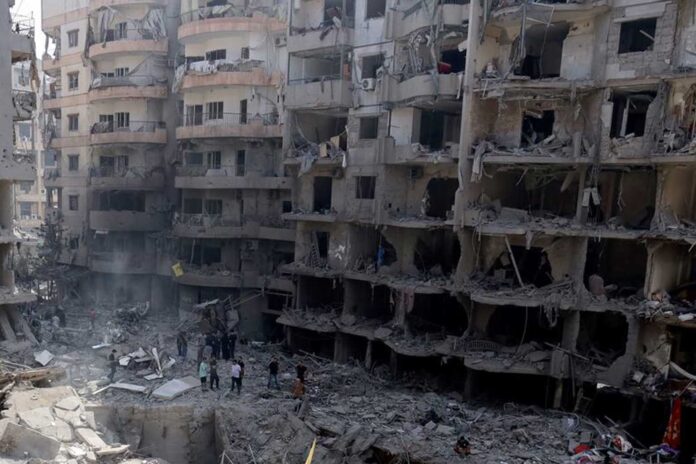The United Nations has launched a $426 million aid appeal to support over one million people displaced in Lebanon due to ongoing Israeli airstrikes and a limited ground incursion. The strikes, which have already claimed more than 1,000 lives, have exacerbated the humanitarian crisis, with the UN warning of further displacement and devastation in the region.
The UN Office for the Coordination of Humanitarian Affairs (OCHA) spokesperson Jens Laerke described chaotic scenes across Lebanon, as residents fled relentless airstrikes that have ravaged communities. “We do not have enough supplies or capacity to respond adequately, and this is why we are launching this appeal,” Laerke said, emphasizing the need for immediate funds to address the worsening crisis.
Lebanese civilians bear the brunt
The situation has escalated following Israel’s announcement of “limited, localized, and targeted” ground operations in southern Lebanon. The UN Interim Force in Lebanon (UNIFIL) confirmed that it had been informed of the Israeli military’s plans, with its peacekeepers remaining stationed in the area. “Despite this dangerous development, peacekeepers remain in position. We are regularly adjusting our posture and activities,” UNIFIL said in a statement, reiterating that any incursion into Lebanon would violate its sovereignty and UN Security Council resolution 1701.
With Israeli airstrikes continuing and the situation deteriorating, the UN has urged all actors to step back from escalating the violence. “We need to stop this development and de-escalate this conflict as soon as possible,” Laerke warned. “It’s easy to break things and hurt people, but getting them back to some sort of normality takes a long time and costs a lot of money.”
Humanitarian crisis worsens
UN officials are gravely concerned about the mounting humanitarian crisis in Lebanon and across the region. According to the UN human rights office (OHCHR), the violence in the Middle East has the potential to spiral into a full-scale regional catastrophe. OHCHR spokesperson Liz Throssell expressed concerns that the consequences of Israel’s actions in Lebanon could lead to widespread devastation.
“Too many innocent children, women, and men have been killed, and too much destruction has been exacted,” Throssell said. She highlighted the displacement of over one million people in Lebanon, alongside the displacement of 60,000 in northern Israel due to Hezbollah’s response to Israel’s war in Gaza. “The consequences for civilians have already been terrible, and we fear that a larger-scale ground invasion by Israel into Lebanon would only exacerbate the suffering.”
Throssell also emphasized the need for all parties to the conflict to distinguish between military and civilian targets, as required by international humanitarian law. “They must do all they can to protect civilian lives, their homes, and essential infrastructure,” she said, warning of the dire consequences of failing to do so.
Gaza crisis continues
Meanwhile, the situation in Gaza remains critical, with humanitarian needs reaching unprecedented levels. UNRWA, the UN agency for Palestinian refugees, reported that 1.9 million people have been displaced in Gaza, and over 41,000 people have been killed in the year-long conflict. “I can tell you that 63 percent of buildings have been damaged or destroyed, but I cannot quantify the horrors that people have endured relentlessly for 12 months,” UNRWA spokesperson Louise Wateridge said.
Speaking from Amman, Wateridge described the immense psychological and physical toll of the conflict on Gaza’s population, with doctors in hospitals overwhelmed by the number of casualties. “The situation in Gaza is as bad as it’s ever been,” she said, urging for an immediate ceasefire and the safe delivery of humanitarian aid to those in need.
Appeal for ceasefire
The UN continues to push for de-escalation across the region, calling for a ceasefire and a political solution to the conflicts in both Lebanon and Gaza. “We need an immediate ceasefire, the return of hostages, and the sustained delivery of aid to allow families to rebuild their lives,” Wateridge said, reflecting the UN’s call for urgent international action to prevent further bloodshed.
As the situation worsens, the international community is being urged to respond to the humanitarian appeals and work towards a peaceful resolution.










